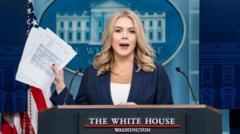A judge's decision reinforces First Amendment rights as the AP's access to presidential events is restored.
Court Ruling Mandates Access for AP Journalists to White House Events

Court Ruling Mandates Access for AP Journalists to White House Events
Federal judge sides with Associated Press, overturning Trump administration’s ban.
In a significant ruling, a U.S. District Judge has mandated the restoration of access for Associated Press (AP) journalists to presidential events after the Trump administration blocked them over a naming dispute concerning the Gulf of Mexico. The order, issued by District Judge Trevor McFadden, emphasized that restricting access based on the viewpoints of journalists contradicts the First Amendment's guarantees of free speech.
The conflict arose when the AP declined to refer to the Gulf of Mexico as the “Gulf of America,” following an executive order by President Trump to rename the body of water. This decision led to the White House restricting the AP's attendance at press briefings, alongside events held on Air Force One. Judge McFadden, appointed by Trump himself, stated that if the government allows some journalists entry to its events, it must do the same for others, regardless of differing opinions on language.
Following the ruling, AP spokesperson Lauren Easton expressed gratitude, highlighting that the decision upholds the fundamental rights of the press and public to communicate freely without governmental reprisal. Other organizations, including the Knight First Amendment Institute, echoed this sentiment, describing the earlier exclusion of the AP as retaliatory and unconstitutional.
The AP had taken legal action against current administration officials, claiming the restrictions were an unlawful infringement on press freedom. The Trump administration maintained that the AP did not have an entitlement to special access. Despite the challenges, the AP intends to continue using the term “Gulf of Mexico,” while acknowledging the White House's rebranding efforts.
As the ruling's implementation is temporarily on hold until the administration's legal team can appeal, the consequences of this decision could have lasting implications for press freedom and government accountability.
The conflict arose when the AP declined to refer to the Gulf of Mexico as the “Gulf of America,” following an executive order by President Trump to rename the body of water. This decision led to the White House restricting the AP's attendance at press briefings, alongside events held on Air Force One. Judge McFadden, appointed by Trump himself, stated that if the government allows some journalists entry to its events, it must do the same for others, regardless of differing opinions on language.
Following the ruling, AP spokesperson Lauren Easton expressed gratitude, highlighting that the decision upholds the fundamental rights of the press and public to communicate freely without governmental reprisal. Other organizations, including the Knight First Amendment Institute, echoed this sentiment, describing the earlier exclusion of the AP as retaliatory and unconstitutional.
The AP had taken legal action against current administration officials, claiming the restrictions were an unlawful infringement on press freedom. The Trump administration maintained that the AP did not have an entitlement to special access. Despite the challenges, the AP intends to continue using the term “Gulf of Mexico,” while acknowledging the White House's rebranding efforts.
As the ruling's implementation is temporarily on hold until the administration's legal team can appeal, the consequences of this decision could have lasting implications for press freedom and government accountability.





















